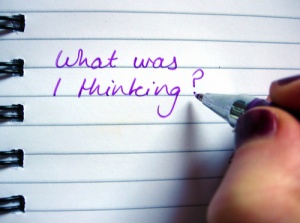Reflection
| Foundation Skills | |
|---|---|
| Lecturer self-evaluation | |
| Reflection as a way of self-evaluating teaching practice | Objectives | Reflection | Self-evaluation of teaching practice | Methods for self-evaluation | Summary |
- What is reflection?
Is it some fancy jargon? Is it something that other people do? You may already be using reflection in a formal way in your professional practice. Even so, try the next exercise as it may be a fresh way of thinking about reflection. Many of us reflect in everyday life when thinking about an event or situation, to try and make sense of it. The trick is how to gather all the thoughts that can end up buzzing around in your head, and organise them. Writing thoughts down and/or talking to someone about them can help to make sense of them. We will start with thinking about a situation in your personal life, and later extend the concept of reflection to your teaching practice.
- The process of reflecting
- Consider an instance in your everyday life experience when something worked really well for you. What made it work well? Perhaps you have recently returned from a holiday and are able to describe it as: 'the best holiday I've ever had'; think about what made it so good. What would you tell your friends and family about your wonderful holiday, and why it was so good?
Try to answer these questions relating to this good holiday:
- where did you go?
- how did you decide where to go, and what was involved in planning this holiday?
- what were your expectations?
- to what extent were your expectations met?
- why did you enjoy your holiday?
- what would you do differently next time?
So, as you may now realise, reflecting on your holiday experiences is not just about looking at photos, or talking about good excursions - it is more than that! At this stage, you may be able to identify particular steps in your thinking. What, how and why? What actions will you take next time to make it an even better experience?
- Reflecting using a three-step process.
- The Three-Step Reflective Framework was developed by Dr Bronwyn Hegarty (2011a). It is accompanied by a Three-Step template that you can follow to structure your reflective writing.
The prompting questions in the framework encourage you to really pay attention to your experiences, and move beyond basic description to analyse your actions, learning, and emotional reactions, thus examining your practice more critically and from several different perspectives.
Think about a situation in your teaching context that has puzzled you. This could be an interaction with a colleague or a student. You do not need to focus on a teaching session, as this comes next in the self-evaluation topic.
|
